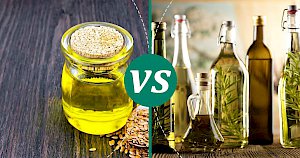Olive Oil vs Linseed Oil: Nutrition, Calories & Protein Compared


Olive oil vs Linseed oil
Nutrition Facts
Serving size:
change
5g10g15g20g30g40g50g60g80g100g120g140g160g180g200g220g250g300g350g400g450g500g600g700g800g900g1000g
1oz2oz3oz4oz5oz6oz7oz8oz10oz12oz15oz20oz25oz30oz35oz40oz50oz
Amount Per Serving:
Serving size:
change
5g10g15g20g30g40g50g60g80g100g120g140g160g180g200g220g250g300g350g400g450g500g600g700g800g900g1000g
1oz2oz3oz4oz5oz6oz7oz8oz10oz12oz15oz20oz25oz30oz35oz40oz50oz
Amount Per Serving:
Olive Oil vs Linseed Oil 100g Compare
| per 100g | Olive oil | Linseed oil |
|---|---|---|
| Calories | 884 | 884 |
| Fat | 100 g | 99.98 g |
| Calcium | 1 mg | 1 mg |
| Phosphorus | 60.2 mg | 9.3 mg |
| Zink | 60.2 mg | 9.3 mg |
| Vitaminium E | 14.35 mg | 0.47 mg |
| Vitaminium K | 0.06 µg | 0.009 µg |
The Enchanting World of Olive Oil and Linseed Oil
When it comes to oils, olive oil and linseed oil stand out not just for their culinary uses but also for their rich histories and health benefits. Olive oil, a staple of the Mediterranean diet, is celebrated for its role in promoting heart health and longevity. Linseed oil, also known as flaxseed oil, doesn't fall short either, with its impressive omega-3 fatty acid content making it a favorite among nutritionists. But there's more to these oils than just their health benefits. Let's dive into the fascinating world of olive oil and linseed oil, comparing their nutritional values, uses, and why they might be the perfect addition to your pantry.
A Closer Look at Nutritional Content
At first glance, olive oil and linseed oil seem remarkably similar in terms of calories, with both providing a dense energy source at 884 calories per 100 grams. However, the devil is in the details. Olive oil boasts a higher content of monounsaturated fats, known for their heart-healthy properties. Linseed oil, on the other hand, is lauded for its high omega-3 fatty acid content, particularly alpha-linolenic acid (ALA), which is essential for heart health and reducing inflammation.
While both oils have negligible amounts of carbohydrates, fiber, and protein, linseed oil contains a small amount of water and a trace of protein, making it slightly less fat-dense than olive oil. When it comes to vitamins and minerals, olive oil shines with its iron, potassium, sodium, and zinc content, along with a significant amount of vitamin E, known for its antioxidant properties. Linseed oil, although lagging behind in vitamin E, provides a modest amount of vitamin K.
Not Just for Cooking: Diverse Uses of Olive Oil and Linseed Oil
Olive oil is not just a kitchen staple; it's also used in skincare products for its moisturizing and antioxidant properties. Its versatility extends to being a natural hair conditioner and a base for homemade salad dressings and marinades.
Linseed oil, with its strong bonding properties, finds its place outside the kitchen in the realms of wood finishing and paint production. However, when it's food-grade, it can be a nutritious addition to smoothies or salad dressings, albeit with a caution to never heat it due to its low smoke point.
Which Oil Should You Choose?
Choosing between olive oil and linseed oil depends on your nutritional needs and culinary applications. For everyday cooking and flavor, olive oil is unmatched, with its ability to enhance dishes while providing heart-healthy fats. Linseed oil, with its distinct flavor, is best reserved for cold dishes and boosting your omega-3 intake.
Both olive oil and linseed oil offer unique benefits and can have a place in a well-rounded diet. Whether you're drizzling olive oil over a fresh salad or adding linseed oil to a morning smoothie, incorporating these oils into your diet can contribute to a healthier lifestyle.
In conclusion, the journey through the world of olive oil and linseed oil reveals a landscape rich in history, nutrition, and versatility. Whether used in the kitchen or as part of your beauty routine, these oils offer more than just their sumptuous flavors—they provide a gateway to a healthier, more vibrant life.
Olive oil 100g
884kcalCalories source
- 0% CARBS.
- 0% PROTEIN
- 100% FAT
100g | ounce | tablespoon | teaspoon | glass | cup | small glass | cup | half cup
Linseed oil 100g
884kcalCalories source
- 0% CARBS
- 0% PROTEIN
- 100% FAT
Compares of olive oil
- Olive Oil vs Coconut Oil
- Olive Oil vs Palm Oil
- Olive Oil vs Almond Oil
- Olive Oil vs Sunflower Oil
- Olive Oil vs Avocado Oil
- Olive Oil vs Linseed Oil
- see all compares of olive oil
Marcin Piotrowicz
calories-info.com creator
Healthy diet and healthy lifestyle promoter
Add comment